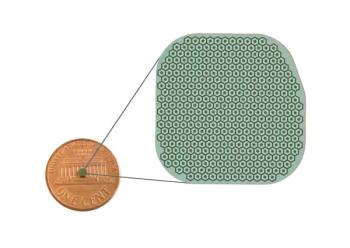
AOA 2023: Push for diversity, equity, and inclusion in optometry
Charissa Lee discusses diversity, equity, and inclusion within her role at Johnson & Johnson Vision and in the industry overall.
Transcript
Editor's note: This transcript has been lightly edited for clarity.
Emily Kaiser:
Hi, everyone. I'm Emily Kaiser with Optometry Times, and I'm sitting down with Dr Charissa Lee, of Johnson and Johnson Vision, who's receiving 2 awards at AOA. She's here to speak about diversity, equity, and inclusion efforts across the industry, but specifically about her work at Johnson & Johnson Vision. So, welcome Dr Lee. Thank you so much for taking the time to talk to me.
Charissa Lee, OD, MBA, FAAO:
Thank you for having me.
Kaiser:
Happy to have you here. So first, can you give us an idea of the ongoing DE&I efforts in the industry and at Johnson & Johnson Vision?
Lee:
Sure, I mean, I am so proud to be part of a company who elevates diversity, equity, and inclusion, not only internally, but also externally for all of the customers that we serve. One of the things that I'm proud of, is [that] we were able to make that outward commitment. Which was a few years back, but it's about supporting new programs to improve representation of people of color in optometry. Also, it's about bringing more diversity, and equity to the eye care industry in general, and, for us, making sure that we are creating more culturally relevant material, like patient education material, [and] just being cognizant of that. So, those are some of the commitments that we made internally within our own team [at] Johnson & Johnson Vision, but also through outward commitments like signing 13% Promise.
Kaiser:
Fantastic. How have you witnessed a meaningful change in DE&I efforts in optometry since the beginning of your career? Can you tell us a little bit about that?
Lee:
Yeah, so absolutely. I started my career in optometry as a student. I will say, there are subtle things that you notice as a student. I was coming from the west coast and went to the east coast for school, and just learning the new culture of being [at] SUNY. I was in New York City coming from California, just learning the culture of being on the East Coast, and specifically Manhattan. But also, I remember being exposed to a lot of different cultures that I hadn't learned about. Being able to learn from my classmates, and being able to celebrate that, [was] one of the first exposures to understanding what the makeup of my community of optometric professionals was going to look like. I would say, thinking about the cultures and ethnicities that maybe weren't represented as much, were also opportunities. I think that was just maybe an unconscious thought in my head as a student. But certainly over the last 10 years, we've seen a huge influx of women. It was certainly apparent during my time when I was in school as well, which is also something to celebrate. One of the things that I've learned along the way, also being in the business side within Johnson & Johnson Vision, is making sure that, I myself, lean into the leadership opportunities that are presented as a female optometrist or female leader. Also, being able to help whether it's mentor, whether it's asking the questions or asking people to the table, or other female, or maybe less represented, diverse voices to the table.
Kaiser:
Absolutely. You're being honored at AOA with two awards, the 2023 Optomic Industry Leadership award from ASCO for noteworthy contributions that have advanced both ASCO and the optometric education, as well as the AOA Apollo Award for leadership and participating as a charter member of the Healthcare Alliance for Patient Safety. Can you tell me a little bit more about the efforts that led to these achievements?
Lee:
ASCO is a great organization and I am honored to be given this award this year. ASCO is another group that we partnered with, specifically in the diversity, equity, and inclusion space. Also, something really important to the schools and colleges of optometry is the opportunity to make sure students feel like they belong in that community, as well. [I'm] really, again, proud to belong to an organization like Johnson & Johnson Vision where we can help bolster the great work that ASCO is already doing in this space. [Also] making sure that we can create not only more awareness, but also education for those who feel the need to be allies in this space. Whether it's their Eyes on Diversity series that they had and showed, not necessarily optometric professionals as subject matter experts, but they were able to get speakers from the area of DE&I to help us understand how we can support our communities better. They have a whole host of resources and education available too, not just to doctors and students, but also to staff as well. So again, happy to partner with ASCO in that area, and really thankful that we were able to play a part in the future of what optometry will look like in the years to come. I will say the HCAPS Apollo award, again, happy to be a part of the Healthcare Alliance for Patient Safety. At Johnson & Johnson Vision, we are a leading and founding member. HCAPS does great work in the advocacy space, another area that I'm passionate about. Again, it focuses back on our communities in the patients that we serve, and being able to help create better patient outcomes through awareness, through legislation, and through visits to Capitol Hill. So, [I'm] excited about the fly ins that are going to happen in DC this week.
Kaiser:
Fantastic. So, looking to the future, how would you like to see the industry change to become more inclusive?
Lee:
That's a great question. I think it just starts with awareness and takes each of us being reflective on our own, I'll say, unconscious biases. I grow and aspire to grow every single day. I'm a lifelong learner. One of the things that I have learned through this, is the difference and what each person, as an individual, can do. I will say, at the very least, I can be an ally and can be a voice to raise the awareness for people to do that, [to] go along their own journeys of learning. I think of us as a community, and we can support each other and celebrate our diverse voices. Again, thinking about being a Californian and moving to New York, [there are] certainly different ways of looking at the world and engaging with people, having that diverse experience or being able to come from someplace different into a new place. Being able to think back and relish those people who supported me, and helped me adjust into this new culture in New York, that was so memorable for me, and really impactful. As we think to our future and think about the communities that we serve, [just] trying to educate ourselves, make our patients feel welcome, and reach out to our communities [will] help uplift everybody in our communities that we touch.
Kaiser:
Okay, fantastic. Thank you so much for taking the time to talk to me. This has been an absolutely lovely conversation, and I can't wait to see how these efforts come into fruition. Congratulations again on your awards.
Lee:
Thank you, thank you so much.
Newsletter
Want more insights like this? Subscribe to Optometry Times and get clinical pearls and practice tips delivered straight to your inbox.




























